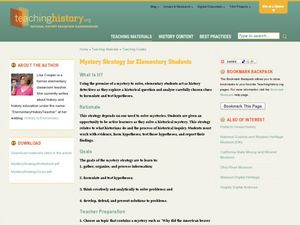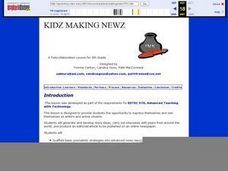Curated OER
Alexander Hamilton and the Roots of Federalism
Explore the origin of political parties in the United States. Learners work in groups to read and analyze copies of the "Report on Manufactures" written by Alexander Hamilton. Then, they complete a worksheet comparing the Federalists to...
Curated OER
What's In a Phrase? Finding Historical Understandings in an Immigrant Guidebook
Using a Chinese-English phrase book from the late 19th century, learners view a glimpse of life on the frontier for a Chinese immigrant. They work in groups and on their own to analyze and summarize the content of various phrases, given...
iCivics
Drafting Board: Military Intervention
Should countries use their militaries to stop humanitarian crises in other countries? Learners make claims, organize their reasoning, and provide evidence for their arguments with this rich resource.
iCivics
Drafting Board: Electoral College
Should the president of the United States be voted by the Electoral College or the popular vote? Your young historians will consider the pros and cons of the Electoral College, and make an argument using reasons and evidence provided in...
iCivics
Drafting Board: Community Service
Should schools impose community service graduation requirements? In the final lesson of the Drafting Board series, learners solidify their practice of crafting an argument supported by sound reason and evidence.
University of Wisconsin
Analyzing Presidential Campaign Propaganda
Campaign propaganda has evolved from 1952 through the presidential election of 2008. A social studies activity prompts class members to analyze the devices used in ads and political cartoons, noting strategies they believe would work to...
Curated OER
Marine Mammal Diving Reflex
Tenth graders discuss marine mammal diving reflex, and measure pulse rate while holding their breath under three conditions: control, warm water, and ice water to determine if humans exhibit marine mammal diving reflex.
Curated OER
Rights and Responsibilities: Grass Born to Be Stepped On
Students research an event in history in which rights and responsibilities are involved. They create a movie of the information they find.
Curated OER
"Old 300"
Fourth graders combine art and history to assess the importance of the "Old 300." They explore a group of colonists that Stephen F. Austin brought to Texas as the first settlers and then create a time line of major events leading to the...
Curated OER
Notable "Texans" of the Texas Revolution
Students investigate why and how certain historical figures became famous in relation to the Texas Revolution. They view and discuss a variety of images, then in small groups record the names of individuals involved in the Texas...
Curated OER
Things Fall Apart: Research, Writing & Presentation Project
A great resource for your unit on Chinua Achebe's Things Fall Apart. Small groups conduct research about related topics (list included), write papers, present PowerPoint slide shows, and take a student-created test. Fill in a few gaps to...
Curated OER
Mystery Strategy for Elementary Students
Learners of all ages solve historical mysteries. Elementary learners research historical topics by organizing information presented by their instructor, formulating hypotheses, and considering solutions to mysteries presented about...
Personal Genetics Education Project
Introduction to Personal Genetics
Adolescents have the opportunity to consider how they feel about the possibilities presented by the current availability of genetic sequencing. After some instruction, they participate in a four-corners activity in which you read a...
Personal Genetics Education Project
Protecting Athletes with Genetic Conditions: Sickle Cell Trait
Should school and professional teams test athletes for sickle cell trait? Will it protect them by providing knowledge or lead to discrimination by not allowing them to participate in sports? After learning about this genetic disorder,...
Speak Truth to Power
Elie Wiesel: Speaking Truth to Genocide to Power
Invite your learners to discover the efforts of Night author Elie Wiesel to promote awareness of genocide in the world. After watching and reading an interview of Elie Wiesel, high schoolers work to create a living Holocaust museum by...
Library of Virginia
Life as an Enslaved People
As part of a study of slavery in the United States, class members analyze documents related to the sale of slaves. They consider not only the text of the bills of sale but also what the appearance of the broadsides suggest.
Curated OER
Backyard Blitz
Students create a landscape design using shapes, colors and textures. A key is created with hyperlinks to information reports pertaining to the plants, trees and shrubs used in the design. Explore design principal utilizing a variety of...
National Endowment for the Humanities
George Washington: The Precedent President
Everyone knows that George Washington was the first president, but do your scholars know why that was so important? The lesson plan, the third in a sequence of three, allows learners to understand how George Washington set a precedent...
National Endowment for the Humanities
The 1828 Campaign of Andrew Jackson: Expansion of the Voting Base
Students give examples to indicate how the franchise was extended and limited in the first half of the 19th century, and cite some differences in the newly enfranchised population that could affect the way they would vote.
Curated OER
Kids Making News
Fifth graders correspond with one another regarding interesting global topics. They swap interview questions and collaborate in the publishing of an online newspaper. This should be a highly motivating lesson plan which get kids writing!
Curated OER
Energy Efficiency Ambassadors
Students research energy conservation devices. They also create their own light efficiency project and presents their findings on science fair night.
Curated OER
Abolitionists and Their Impact on Sectionalism
Eleventh graders examine the impact of Abolitionist leaders on sectionalism. In small groups, they conduct research on a famous abolitionist, and develop and write a newspaper cover page based on their assigned abolitionist.
Curated OER
After the American Revolution: Free African Americans in the North
Students investigate the life of African Americans in the North during the American Revolution. They analyze how authors use various techniques to write biographies, read about Sojourner Truth, conduct research, and write an excerpt...
Curated OER
The Industrial Age in America: Sweatshops, Steel Mills, and Factories
Students investigate the working conditions during the Age of Industrialization. They research how workers reacted to the conditions and discuss the results of labor movement.
Other popular searches
- Primary and Secondary Sources
- Primary Secondary Sources
- Primary vs Secondary Sources
- Primary & Secondary Sources
- Primary, Secondary Sources
- Teaching Secondary Sources
- Primary vs. Secondary Sources

























